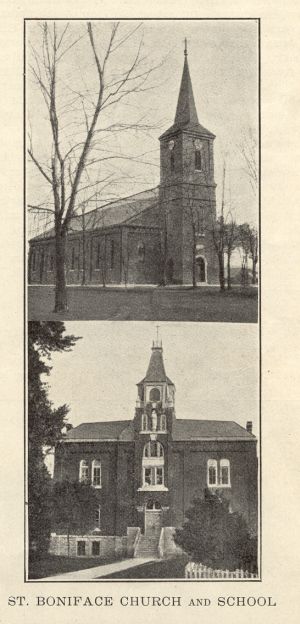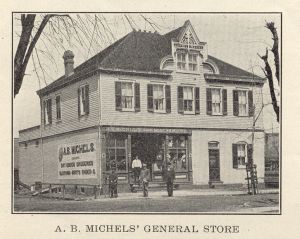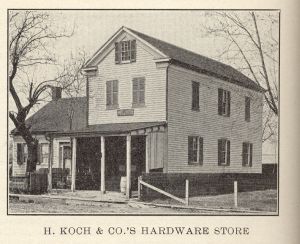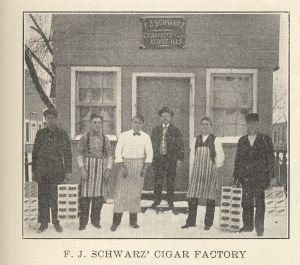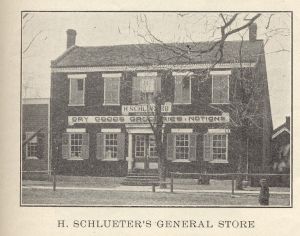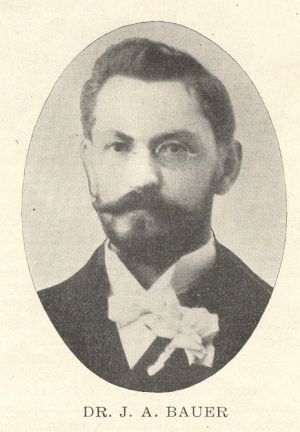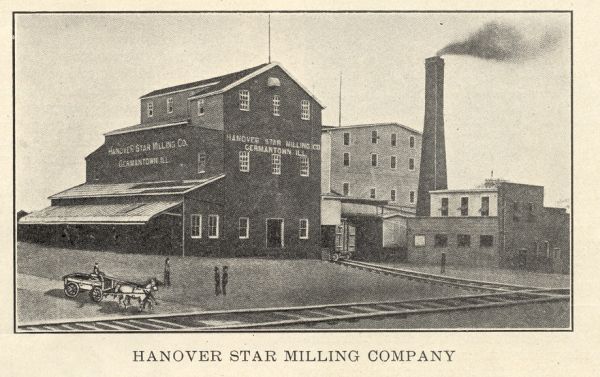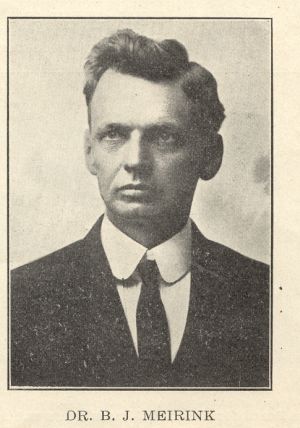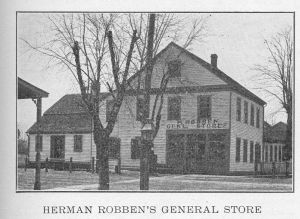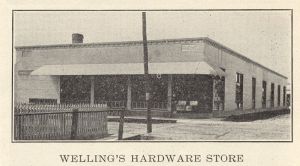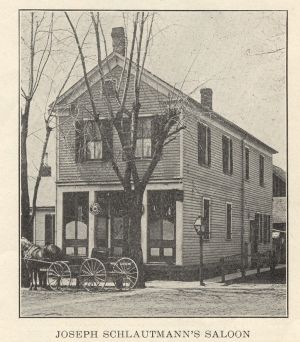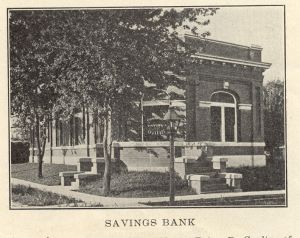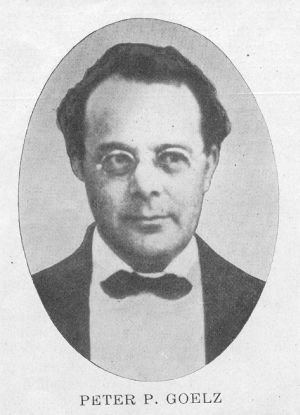|
Page 45 |
|
|
Germantown is one of the progressive towns of the county. It was started many years ago as a small village and today number more than 800 souls. It is located on the Southern Railway, 10 miles east of East St. Louis, 23 miles west of Centralia and 4 miles south of Breese. It is a Catholic settlement, all the business men and residents with the exception of two families being Roman Catholic. The town is settled by thrifty Germans who have made Germantown one of the show places on the Southern Railroad in Illinois. The town has business concerns of every description. Among them are: One large flouring mill, 1 bank, 6 saloons, 1 bakery, 1 barber shop, 3 general stores, 2 hardware stores, 1 lumber yard, 3 blacksmiths, 1 hotel, 1 butcher shop, 1 jeweler, 1 shoe store, 1 harness maker, and up-to-date telephone exchange, 1 implement house, 1 tailors, 1 creamery, 1 cigar manufactory, 2 doctors and 2 beer agents. The city owns an excellent water works system, one of the best in the State. The Catholic church, St. Boniface, is the landmark of the city. It was built in 1854 and is of rock. It is one of the oldest churches in the State and was for many years the only Catholic church in Illinois south of Chicago. The school of Germantown is under the jurisdiction of the church, it's the only one in the little city. Germantown has fine streets and excellent water. Its business men are prosperous for they are of thrifty German stock. When one visits the city he will find everything a hustle and bustle, for the business men have made the little city what it is today, a hummer. It is contemplated by the young men of the city to erect a hall opposite the railway depot, for the purpose of holding dances and affairs of pleasure during the winter season. Several of the younger business men are behind the project. This hall is to be built during the present year, A.D. 1913. St. Boniface Parish The oldest and largest Catholic congregation of Clinton county is the congregation of Germantown. During the summer of 1829, the first Catholic settlers of Germantown - all Germans - bought land to be dedicated as church property, and built a log church on it. True to their conviction that the school is necessary for the social, political and religious well being of mankind, and that school and church must go hand in hand, they used their first church also for school purposes, and thereby established their congregation on a sound basis. The first desultory services were held by Rev. Father MEYER. In 1829, Rt. Rev. Jos. ROSATI, the Bishop of St. Louis, sent Rev. Father OSTLANGENBERG to take charge of the congregation. In August of the same year he was succeeded by Rev. J. FORTMANN. In 1840 a frame church was erected. During the year 1842 Rt. Rev. Bishop ROSATI, D. D., visited the congregation and administered the holy sacrament of confirmation. In 1844 the diocese of Chicago was established and the |
first bishop, Rt. Rev. W. QUARTER. D. W., assigned Rev. FORTMANN to another field of labor in 1845. He was succeeded in short intervals by Revs. TUSCH, JACOB and two Revs. JUNG, until 1848; when Rev. Father MARGUA was sent to Germantown. Under his administration the parish prospered amazingly. It was during his pastorate that the great and saintly Bishop Van De VELDE, D. D.,
of Chicago visited Germantown and administered the holy sacrament of confirmation. During 1851 Rev. MARAGUA built the south portion of the old parsonage, later on converted into a hospital. In 1854 Rev. FORTMANN again took charge of the congregation and he it was who built the present stately rock church, after plans drawn by Architect Robert MITCHELL of St. Louis. Unfortunately, owing to fear of burdensome debt, the walls were not carried to the contemplated |
|
Page 46 |
|
|
height. This massive church is 148 feet long and 65 feet wide. The contractor had to build the church, and carry the steeple to a height of 44 feet, for the sum of $24,000. This work was done by 1856, when Rev. PATCHOSKI, S. J., dedicated this beautiful church to the service of God. During the interim from 1857 to 1865, a number of zealous priests labored at St. Boniface parish. Among them Rev. KRAMER, Rev. FROHBOESE and Rev. BERGER. The latter worked hard to collect funds for the completion of the steeple, but died before seeing his cherished plan a reality. His successor was the energetic and zealous Rev. B. BARTELS. He had the steeple completed, he renovated and decorated the interior of the edifice, in a truly artistic manner, embellishing it with many choice pictorial representations. Under the care of Father BARTELS, a new and stately parsonage, a magnificent school and a Sisters' house was built. After the transfer of Rev. Father BARTELS to Bartelso, Rev. Father W. CLUSE, now Rt. Rev. Msgr. W. CLUSE, V. G., was assigned to this pastorate. Under his vigilant care the congregation continued its prosperous course. He devoted great care to the cemetery especially, beautifying it with a magnificent set of Stations of the Cross, as also a crucifixion group, carved in marble. Msgr. CLUSE later on was sent to East St. Louis to take charge of St. Henry's parish. The present pastor of St. Boniface parish is Rev. Markus ROTH, C. M., who came to Germantown in June, 1909. Father ROTH was born in Germany, studied for the priesthood at Innsbruck, Tirol, Austria and was ordained a priest on March 15, 1891. His assistant is Rev. A. KIEFER. The school at Germantown has always been an excellent one. Principal of the same is Mr. John A. KELSER, while six Sisters aid in teaching. The number of pupils enrolled is about three hundred. Under the direction of Prof. KELSER the music at divine services is strictly liturgical, Gregorian and Cecelian music predominating. The choir numbers twenty-eight members. During the past few years an excellent pipe organ has been installed. It contains about 1,400 pipes, and its melodious sound is fit to re-echo from the arches of beautiful St. Boniface Church. A. B. MICHELS This is one of the largest stores in the city and has been located on the same corner for the past 25 years. Mr. MICHELS has been a resident of the city for 34 years. A general line of dry goods, clothing, groceries, hats, caps,
shoes, notions, chinaware, tinware, glassware and jewelry is carried in stock. The stock is valued at $8,000. The yearly business transacted by the above is very large |
and growing larger every year through the popularity of the manager. The store and warehouse adjoining covers an area of 35X100 feet and is stocked to its capacity with merchandise. Mr. MICHELS was born in Hermann, Mo., in 1858 and was married to Miss Mary GISSY in 1880. Five boys and one girl graced this union, all are living. One of the sons is married and lives in Germantown and one of the children lives in East St. Louis. Mr. MICHELS is a director of the Germantown Savings Bank and has a son who is cashier of the bank. He is well liked by all the residents of Germantown and surrounding territory, his business is increasing rapidly every year. H. KOCH & Co. Lumber, lime, hair, cement and a general line of building material is carried in stock by the above named who is the father of Fred J. KOCH of New Baden, the representative of that district. Mr. KOCH's place of business
is the only one of its kind in the city. He has been in business 51 years and is one of the pioneer business men of Germantown. He started into the furniture business 51 years ago and 30 years ago added a stock of hardware. Twenty-one years ago he added lumber and has since been increasing his sales every year. He was born in Germany in 1859 and has been resident of Germantown for 51 years. He was married 40 years ago and is the father of 10 children all of whom are living. He marred Miss Mary A. WETER. His furniture store in located on the north side of the railroad and the lumber yard on the south side. Four of the sons and one daughter live in New Baden, one of the sons in St. Louis, one in Jasper, Indiana, where he is teaching school and one is studying for the priesthood at Allegheny, N.Y. One daughter is a nun and the other is at home where she assists the mother in the household duties. Mr. KOCH is one of the best known business men in the county and one of the best liked as well. F. J. SCHWARZ Germantown is justly proud of its cigar factory for one of the finest five-cent brands of cigars in the State is made there. Everybody knows the "Germantown" cigar and they smoke it, too. Mr. SCHWARZ has been in the cigar manufacturing business since 1911, and can manufacture 10,000 cigars yearly, a good average for a small factory in a town the size of Germantown. He was formerly connected with the cigar business in Breese and lived there for many years prior to locating in his present city. His cigars are sold all over the central part of the State, and include the following well-known brands: "Germantown," "Frank's Best," "No 5," and "Little Sultans," five-cent cigars, and "National Congress," |
|
Page 47 |
|
|
a ten-cent seller. He also sells and has a large trade on cigar clippings which are pure and unsweetened. Mr. Schwarz has been a resident of Germantown for the past two years and before starting into the cigar business at Breese was connected with the postoffice and a general store there.
He was born in Breese in 1878 and was married to Ann DUMBECK, in 1906. The couple are the parents of three children, two boys and a girl. H. SCHLUETER Mr. SCHLUETER has been conducting a general merchandise store in Germantown for the past five years and his business is growing rapidly. He is one of the pioneers of the city, having been born in Germantown in 1861. He is a dealer in everything in the general mercantile line including dry goods, clothing, shoes, hats, caps, groceries, queensware, granite and glassware, chinaware, hardware, feed, produce and flour; he also carries a stock of millinery, and his stock of merchandise is valued at $3,000. He does an average business annually of over $10,000 and is one of the most progressive merchants in the city. He has been an Alderman or member of the
Town Board for the past thirteen years and is well liked by all who know him; his friends are many. He was married in 1882 to Miss Mary MUELLER and is the father of nine children, one of them being dead, seven boys and three girls were in the family until one of the girls died |
several years ago. Two of the sons are married; one living in Breese and the other in Belleville. Those at home help the father in the store. F. H. HALLERMANN The only hotel in the city is operated by the above named. It has been under the present management for two years although F. H. HALLERMANN's mother, Mrs. A. HALLERMANN, was interested in the business for forty years before that. The hotel is located near the church and contains nine rooms, and the rates are $1.50 a day. A saloon is operated in connection with the hotel and is also managed by the above named. Mr. HALLERMANN was born in Germantown in 1879 and married six years ago to Elizabeth SCHWARZ and is the father of three children. Mrs. HALLERMANN was also born in Germantown. Dr. J. A. BAUER Dr. BAUER is one of the able physicians and surgeons of the city of Germantown. He has been practicing medicine in the little city for the past fifteen years. He studied medicine in the Beaumont Medical College in St. Louis and graduated with high honors from that institute in 1873 and came to this county in 1890. He was mar- [sic] and later looking over the field in search of a new location decided that Germantown was the place. He was
lecturer of histology in the Beaumont College for a time and is a very able practitioner. He was born in Germany in 1873 and came to this country in 1890. He was married to Miss Elizabeth SCHLARMANN in 1903 and has raised four children out of a family of six, two dying in infancy. He is a member of the Men's Sodality of Germantown, a member of the Commercial Club and was the organizer of the Clinton County Districts Verband of German Catholic Societies. He was president of this Verband for a number of years. He was first vice-president of the Illinois D. R. K. Staatsverband and is now president of the same. He is also a member of the Clinton County Medical Society. His practice extends all over the central, southern and eastern part of the county. Dr. BAUER is esteemed for his strict attention to business. Hanover Star Milling Co. The Hanover Star Milling Company was built by John NIEMEYER, Henry LAMPEN and Henry KLEINEKORTE, a company in 1859. During the many years since its organization it has changed management several times. In 1859 it was under the management of USSELMANN and SCHURMANN Company, from 1871 to 1883 SPREHE and SCHURMANN |
|
Page 48 |
|
|
were the owners of the mill and in 1883, the present company, which comprise Henry and Edward SCHURMANN took charge. The mill is up-to-date in every respect and has a capacity of 450 barrels per day. The product is shipped all over the entire South and Southeast and a very large amount of flour manufactured is shipped all over the county. The leading brands are "Leonora," "Rose High Patent" and "Tea Rose." During the year 1912 the company shipped 100,000 barrels of flour out of the city. The mill is five stories high, built of frame and covers an area of 60X129 feet. The elevator is 50X60 feet and has a storage capacity of 50,000 bushels. About ten thousand barrels of flour are sold in the county annually and a large number of shipments of feed and other mill products are sold. Henry SCHURMANN, the president |
him in the shoe business, and one of them is employed in the Reynolds Shoe Store in East St. Louis. One of the daughters is also in that city. Theodore, a competent shoemaker, is connected with the business Bernard John MEIRINK, M.D. On of the prosperous and popular physicians of Germantown, Bernard John MEIRINK, M.D., is a close student of the science which he has chosen as a profession, and in its practice is meeting with well-deserved success. A native of Illinois, he was born July 3, 1872, in Breese, Clinton county, his grandfather, Henry MEIRINK, Sr., having been an early settler of this section of the state. The doctor's father, Henry MEIRINK, Sr., was born in |
|
|
|
|
of the company, was born in St. Clair county in 1847 and has been a resident of this county since 1849, having settled in that year with his parents. He was elected County Clerk in 1870 and lived in Carlyle 12 years. He held the office of County Clerk ten years. After the expiration of his residence in Carlyle he returned to Germantown and has been a resident of that little city ever since. He was married in 1870 to Miss Elizabeth ALBERS and was the father of ten children, eight of whom are living; there were five boys and five girls. Two of the boys and one girl are in the mill with the father. Edward, the second oldest son, is connected with his father in the management of the mill, the daughter is employed as stenographer and assistant bookkeeper. Another daughter lives in Germantown and is married to one of the prominent citizens of the city. One of the married sons lives in Breese. H. HOFF and Son This firm was started in 1876 as a made-to-order shoe factory. When made-to-order shoes went out of business so to speak, Mr. Henry HOFF put in a stock of ready-made shoes and still kept up manufacturing shoes for those few who still desired to have their shoes made to fit. Today he has a stock of shoes that is a credit to any town in the State. This firm carries all the leading brands of shoes. His stock is worth over $2,000 and his annual business amounts to several thousands of dollars. He does a general line of repairing and occasionally has an order for made-to-order shoes, which order he fills promptly. In 1876 Mr. HOFF bought the business from August BOLLE. Mr. HOFF learned the trade in Germany where he was born in 1853. He came to Germantown from Aviston, Ill. He was married in 1876 to Mary HOLLENKAMP and was the father of six children, two girls and four boys. One of the boys is dead. One of the sons is connected with |
Germantown, Ill., in 1842. He married in 1869, Anna SCHOENEFELD of Breese, and to them two sons and five daughters have been born, Bernard John being the second child in order of birth. Bernard J. MEIRINK was educated primarily in the
parochial school of Breese, Ill. He subsequently spent three years in the Franciscan College at Teutopolis, Illinois, and in 1890 was graduated with the degree of A. B. Beginning life then as a teacher, he taught for six years |
|
Page 49 |
|
|
in the Becker school in Wade township, during which time he took up the study of medicine for which he was eminently fitted. Continuing his studies at the St. Louis Medical College, he was then graduated with the degree of M.D. in 1899. Since coming to Germantown Dr. MEIRINK has been actively identified with all progressive movements. He is a member and the president of the Clinton County Medical Society, a member of the State Medical Society, and of the American Medical Association. In October, 1899, Dr. MEIRINK was united in marriage with Frances BECKER, of Bartelso, the daughter of Henry BECKER, a pioneer farmer of Wade township. The doctor and Mr. MEIRINK are the parents of three children, namely: Laura, Edward and Paul. True to the religious faith of his ancestors Dr. MEIRINK is a member of the Catholic church. Herman ROBBEN The above named conducts the largest general mercantile establishment in the city and has been in business for the past 27 years in the same building. He carries
a complete line of dry goods, hardware, groceries, queensware, graniteware, glassware, tinware, produce, shoes, hats, caps and flour. His stock is valued at $3,500 and his yearly business will amount to $12,000 on an average. He was born in Germantown in 1862 and has been a resident of the city ever since. At present he is the Village Clerk and has held that office for the past ten years. He is also one of the members of the Village Board and is the former secretary of the Catholic Knights of America, Branch 43 of Germantown. He was married in 1885 to Christina KAHROLL, and the couple were the parents of seven children. The children living are B. Henry, George, Herman, Mamie and Elizabeth. A married daughter lives in Breese. B. Henry, a son, operates a large jewelry store opposite the general store and does a thriving business. The general store covers an area of 50X75 feet and the dwelling adjoining is a one-story frame. WELLING Hardware and Manufacturing Co. The above named concern was established in 1874 by J. T. WELLING and was operated under that name up to the year 1910. It then became the present company. Mr. WELLING has been a resident of Germantown since 1857 and is one of the pioneers of the city. The firm are dealers in hardware of every description and manufacture furniture. They also handle implements, notions, jewelry, and do cornice work of all kind. They also make a specialty of building tanks and have erected several in and around Germantown. The store carries a complete line of everything and the company is incorporated for $20,000. The stock is valued at $10,000 and a yearly business of over $20,000 is transacted. In 1910 fire totally destroyed the old building and all its contents. Two days later Mr. |
WELLING started into business again and later built the present building which is one of the finest in the city. It is located just off the main street and has a floor space
of 132X24 feet in one building, 26X38 in another. Mr. WELLING was married in 1874, the year he started into business, and was the father of eleven children, eight of whom are living. Four of the children are living at home, two are married and live in Germantown and two are living in East St. Louis. Mr. WELLING's mother is still living. She is 87 years old. Joseph SCHLAUTMANN Mr. SCHLAUTMANN conducts a saloon opposite the store of A. B. MICHELS, and one of the best saloons in the city. He has been located in his present place of business for the past two and one-half years as sole manager. He has been in the saloon business longer than any in the city and was connected with two different partners, both of whom he bought out. He sells Obert's beer on draught, and all kinds of bottled beer, wines, liquors and cigars, and his place is the congregating place for the younger generation of the city. They are assured of a good time whenever they visit his saloon. He was born in Germantown in 1882 and was in 1906 married to Annie KAHRROFF.
The couple have three children. Mr. SCHLAUTMANN's saloon is up-to-date and it is considered one of the best patronized of its kind in the city. |
|
Page 50 |
|
|
Germantown Savings Bank The Germantown Savings Bank was organized in 1906 and has been the only banking institution in the city since it was started. The officers are prominent business men of the city and county and comprise the following: Fred J. KOCH,
of New Baden, president; Peter P. GOELTZ, of Bartelso, vice-president; and H. C. MICHELS, cashier. Besides the above three A. B. MICHELS and Henry KOCH, merchants of Germantown are the other directors. There are 19 stockholders in the bank and their estimated wealth is over $500,000. The bank owns its own building and is equipped with an excellent safe and vault of the Hall, Herring and Marvin style. The bank pays three per cent
on time certificates and does a general banking business. Below will be found a complete recent statement of the condition of the bank: Resources. Loans
on real estate................$ 38,688.05 |
Cash on Hand. Currency............................$
12,200.00 Liabilities. Capital stock
paid in...............$ 25,000.00 EVERY STATE MAY HAVE VALUABLE AND PECULIAR SCENERY. Maine gets $74,000,000 a year profit from people who come to fish, hunt, and see her white pines. Florida attracts every winter hundred of thousands of tourists why enjoy the palmettoes and the cocoanuts. Vermont makes a mighty pull in September when her gorgeous "sugar bushes" are aflame with scarlet. The Gulf states draw countless thousands to see the live oaks hung with Spanish moss.. The ideal for every state is to have a type of scenery so distinct that you can tell merely from a picture what state is represented. Or, the scenery should be so peculiar that after a night's ride in the sleeper you can tell where you are by the first glance out of the window. If your glance meets century-old elms brooding over a shady roadway you know you are in New England. If the first thing that greets you is an orange tree laden with fruit, you can make a shrewd guess where you are. If your eyes meet long-leaved pines you know you are somewhere in the Atlantic Coastal Plain, probably one of the Carolinas. And so on. No state can be absolutely unique, but every state can come near it, for every state originally had a strongly marked character, and this can be restored as reverently and successfully as have the great cathedrals. THE "ILLINOIS WAY" OF ROADSIDE PLANTING.* A plan to create a vast State park system without the cost of buying land; to make a new type of scenery that fit the "Prairie State;" and to add millions to our State wealth at a cost of $10.00 to $50.00 per mile per year. It will bring millions of tourists to the State, make new business for farmers and merchants, increase the value of real estate every where and educate a generation of children which will prefer to live in the country. The highest ideal that any State can cherish is to have a character of its own-not to look like all the rest of the world. One reason why Americans spend $300,000,000 a year in Europe is that Europe does not look like the United States. Scotland's big drawing card is not a poor imitation of Italian gardens, but genuine Scotch scenery - mountains covered with Scotch pine, or blazing in August with the purple bloom of Scotch heather. Our motorists go to England in May to ride between miles of English hawthorn hedges, when they are a vision in white. The "pulling power" of every state in the Union can be enormously increased if each state will preserve and intensify its most valuable scenery. In 1899 the per capita production of wheat was 9.7 bushels and in 1909, 7.4 bushels. The acreage of oats harvested in the United States increased from 29,540,000 in 1899 to 35,159,000 in 1909, or 19 per cent. |
This file last modified
